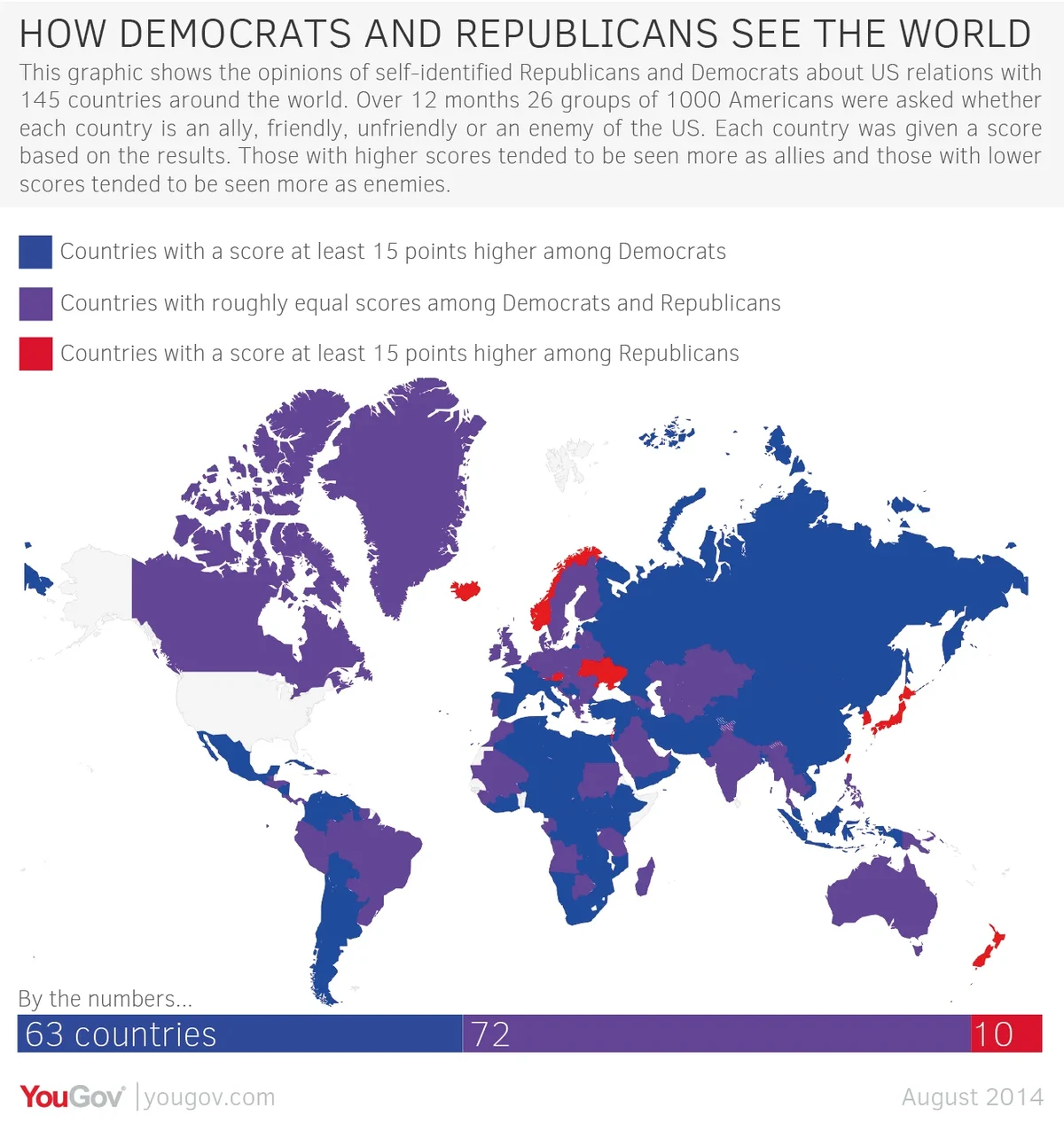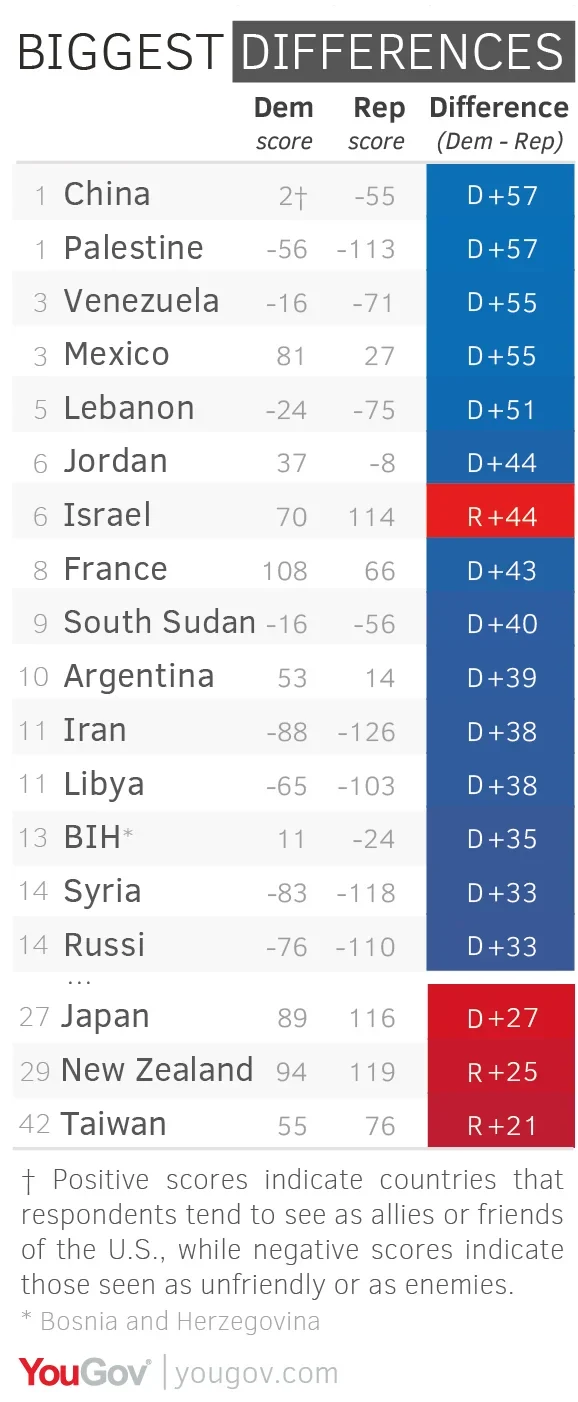How Democrats and Republicans differ on U.S. relations with the rest of the world
Over the last year YouGov asked more than two dozen groups of 1,000 Americans what their impression was of 145 of the world’s countries. A visualization, methodology summary and analysis of the full results can be found here, But the research also allows us to examine, country by country, where people who identify with different political parties disagree when it comes to which countries are friends of the United States, and which are not.

Republicans tend to view countries as less friendly than Democrats
Look at the data this way and the general trend is clear: when compared to Democrats, Republicans generally tend to view the world as a less friendly place.
The average score for a country by Democrats, at +24, is twice that of the average score for Republicans, at +12. The world is not, on the whole, thought of as unfriendly by Republicans – their median score is +8 (essentially neutral territory), meaning most of the countries were given positive scores. But, overall, 109 countries of the 145 countries are given a lower score by Republicans than Democrats. The gap is at least 15 points for 63 of them. Republicans also give lower scores than independents, though the effect is less pronounced (the independent average is +14).
…especially when it comes to America’s biggest “enemies”.
Iran is not seen as a friend to the U.S. by Democrats or independents. In fact, among all political groups only the United States' relationship with North Korea is viewed more negatively than it's relationship with Iran. 32% of Democrats and 42% of independents consider Iran an enemy and few consider it a friend or ally. However, 54% of Republicans see Iran as an enemy, pushing its score 38 points further into the red when compared to Democrats.

There is a similar 57-point gap on Palestine, a 33-point gap on Syria, a 27-point gap on Cuba and a 19-point gap on North Korea. The partisan gap on Iran was even bigger (50 points) before the recent crisis in Iraq, where the U.S. and Iran have found themselves facing a common enemy in the Islamic State, which appears to have both softened feelings about the country (lowering Iran’s score from -120 to -107), particularly among Republicans.
But Republicans don’t paint the whole world with a more negative brush...
While Democrats and independents tend to be less negative about countries that were generally seen as mixed cases (like China or Uganda) or enemies (like Iran or North Korea), Republicans perceive closer ties some of the United States' traditional allies – particularly those that are in unfriendly neighborhoods, like Ukraine, Israel, South Korea and Taiwan. However, there are only ten countries with scores that are seen as friendlier to Republicans than Democrats by a margin of 15 points or more. Only one is seen as friendlier by a margin of more than 30 points: Israel.
…especially when it comes to Israel.
Israel ranks as America’s 6th greatest ally in the world for Republicans. But for Democrats, Israel’s score is 44 points lower, so it ranks 26th, or about on par with Portugal and South Korea. Twice as many Democrats as Republicans are “not sure” whether Israel is an ally or an enemy, and, whereas over half (56%) of Republicans consider Israel an ally, only a third of Democrats (32%) feel the same way. (The lastest survey for Israel was conducted just under two weeks into the conflict, from July 19th-21st. The gap between Republicans and Democrats on Israel has narrowed since the breakout of the most recent conflict in Gaza, but not significantly.)
The reverse is true for France, which ranks 5th among our allies if you ask Democrats, but only 28th if you ask Republicans.
**
Taking each group’s outlook on its own makes it easier to see why there might be a tension between a Democratic and a Republican foreign policy based on public opinion.
From the Republican perspective, the world is a more hostile place, a fact that might help build the case for the more unilateral and hawkish foreign policy that has been part of the GOP platform for decades. Allies are even more important in this world particularly the ones, like Israel and South Korea, with suspicious neighbours. From the other side of the aisle things look rosier: America has more friends, making multilateralism and diplomacy a plausible approach to foreign policy. If it’s true that America has more friends – or at least fewer enemies – commitments to the international norms and institutions embraced by the current Democratic president, and arguably neglected by the last Republican one, are more realistic venues for conflict resolution.
There are also many similarities. The overall shape of the world, in terms of who are our best friends and greatest nemeses are, with only a couple of important exceptions, is basically the same. However, it remains impressive that, even based on questions of foreign relations that don’t mention President Obama or any policies that could trigger a predictable partisan response, Democrats and Republicans see the world in different ways.